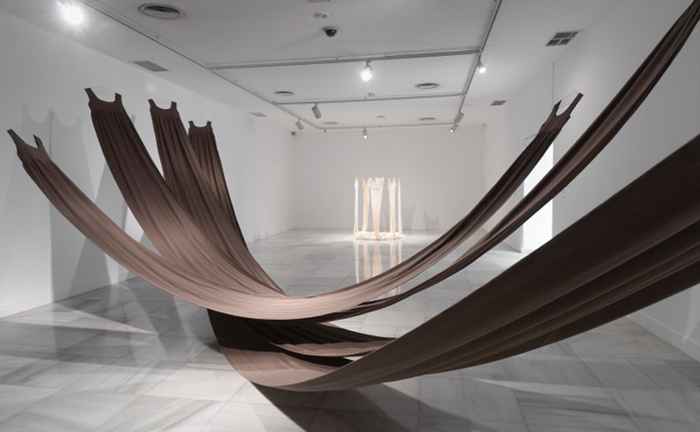“Overflown”: Dress, Textiles and Bodies Beyond Borders
Claudia Casarino, Puente Kyha, 2013. Installation about the migration of Paraguayan rural women.
- Date
- 4 June 2025
- Time
- 15:00 -19:00

In a global context marked by the rise of right-wing governments, the intensification of anti-immigration and anti-gender discourses, and the continued extractivist exploitation in the Global South, the contemporary condition of the world can be read as a hell demarcated by borders. Within this context, fashion, dress, and textile practices emerge not only as aesthetic expressions and cultural phenomena but also as sites of collective emancipatory imaginaries. They offer potential pathways beyond the structures of the nation-state, binary gender norms, and colonial ruination.
This seminar proposes the concept of “overflow” (desborde in Spanish) as a lens through which to explore the complexity and unruliness of dress- and textile-related practices in the “chaos-world.” By deliberately disrupting orthographic convention, the Spanish term desbordado (overflowing) is split into des-bordado. The prefix des- signifies negation or reversal, while bordado derives from the verb bordar, meaning to embroider—to ornament fabric or material with thread. This linguistic play suggests the act of un-embroidering or dismantling an embroidery, inviting us to consider the present moment as an entangled textile: an intricate weave of threads, turns, and knots. “Overflown” thus serves not only as a metaphor but also as a methodological approach: it disavows containment and embraces unruliness as a mode of engaging with our historical conjuncture.
The seminar examines how textile and dress are being used, across different geographical contexts, to negotiate the crossings and entanglements of gender, migration, and anti-colonial resistance. By thinking with and through “the overflow,” the aim is to cultivate a space for experimental scholarship and practice that threads together aesthetic, political, and epistemological forms of disruption.
The event is organized around three thematic sessions:
Panel 1: Dress and [Anti]Colonial Entanglements
Overflow as a Principle: Research, (In)discipline and Anticolonial Praxis
Tamara Poblete (Lecturer in Global Fashion Theory, UvA)
Poblete’s research explores the resignification of clothing as a tool in feminist protests and uprisings in Latin America from 2015 to the present, through the concept of activismo de género. In this context, clothing and its embodied actions are analyzed as forms of aesthetic and political representation, with an emphasis on harnessing the thought and resistance practices of anticolonial feminisms.
Against the Aestheticisation of Decolonisation: Reckoning with Capital and White Supremacy
Dr Serkan Delice (Senior Lecturer in Cultural and Historical Studies, London College of Fashion, University of the Arts London)
His research focuses on the political economy of fashion, investigating how shifts and crises within capitalism shape the global fashion industry. Drawing on anti-colonial, dependency, and world-systems theories, he explores pathways towards reparations and wealth redistribution. His current work critically analyses the impacts of displacement and genocidal violence on fashion systems in the Middle East, with a comparative focus on Armenian, Palestinian, and Kurdish communities.
Panel 2: Dressing the Resistance
Patched-Up and Over: Transforming the Uniform into a Medium of Resistance
Dr Nicole Archer (Associate Professor in Visual and Critical Studies, Montclair State University)
She researches contemporary art and design, with an emphasis in textile and garment histories and the intersections of art, design, and social justice. Her upcoming book Looming Violence examines why we stake our deepest senses of safety in the comfort of textiles, and how textiles correspondingly serve as all-too-convenient mediums for feelings of discomfort and insecurity—feelings that are persistently used to embolden far-right politics and rewrite the limits of ‘legitimate’ versus ‘illegitimate’ forms of violence.
“Desbordar la Infancia”: Children, Clothing, and the Refusal of Control
Lucía Cuba (Assistant Professor of Fashion Design and Social Justice, Parsons)
Peruvian designer, textile artist, and scholar whose work positions fashion as a critical tool for inquiry, expression, and intervention. Through her interdisciplinary practice, she explores the political and performative dimensions of clothing, engaging with issues such as gender, children’s agency, biopolitics, and global fashion systems.
Panel 3. Hair as a Medium
Unruly Masculinities: The Politics of Hair Under Dictatorship
Jazmín Ruiz Díaz (Decolonial Futures Research Fellow, UvA)
Ruiz Díaz has been developing a transdisciplinary project on hair as an insurgent aesthetic-political medium, focusing on the histories of men who wore long hair in Paraguay during the 1960s and 1970s —a period marked by military dictatorship. The first outcome of this project is a chapter forthcoming in an edited volume on global masculinities (Bloomsbury).
Resistance to Bleaching: Hair as Sexual Fiction in “Rubias para el Bicentenario /Blondes for the Bicentenary"
Dr Jorge Díaz (Postdoctoral Research Fellow in Developmental Biology, UCL)
Biologist and sexual dissidence writer. As a postdoctoral researcher at University College London (UCL, 2022–2025), he studies collective cell migration processes. In parallel, he engaged in transdisciplinary work connecting biology, artistic practices, and sexual activism—a convergence reflected in his book Emancipar la lágrima (Trío Editorial, 2021).